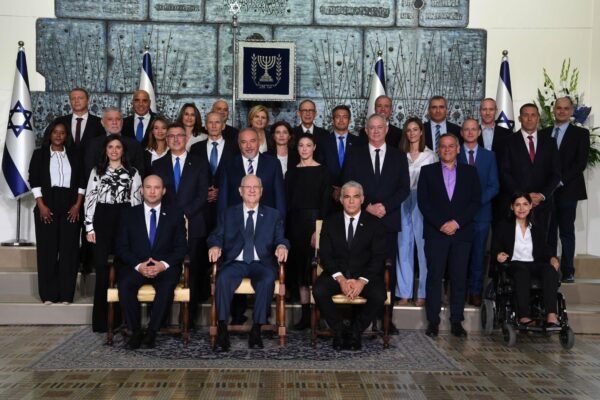The thirty-sixth government of Israel, also referred to as the Bennett–Lapid government – so called because Naftali Bennett (seated row, left) and Yair Lapid (seated row, right) will each take turns in the role of prime minister – is the cabinet formed in June 2021 after the Israeli legislative elections. The coalition government is the first to include an independent Arab Israeli party. Photo credit: Haim Tzach/Israel Government Press Office.

This summer marked a historic transition in the Israeli government, as Benjamin Netanyahu was ousted from his position as prime minister after twelve years. Because Israel has no term limits, Netanayhu could have potentially maintained this position for much longer.
On June 13, 2021, Israeli parliament, the Knesset, voted 60-59 in favor of enacting a new government coalition. Be that as it may, this coalition consists of eight parties with distinct policy platforms and ideological orientations that would seem to be at odds with one another. Ostensibly, the primary objective of this unconventional coalition was to oust Netanyahu, but now that that goal has been achieved, the overall coalition platform is less clear. Delving into the specific priorities of each party may provide some insight into the future of Israeli politics.
 Blue and White, centrist
Blue and White, centrist
Blue and White, a reference to the colors featured on the Israeli flag, was founded in 2019 by Benny Gantz, who holds the position of defense minister in the new government. The party emphasizes strong arms security and preventing the proliferation of nuclear weapons in Iran. Blue and White supports opening negotiations with Palestine, yet also supports Israeli settlements in the Jordan Valley and West Bank.
![]() Labor, left wing
Labor, left wing
Labor was founded in 1968 and is currently less powerful than it has been historically, as it heightened in popularity during the Oslo era. The party hopes, however, to regain prominence under the new leadership of Merav Michaeli, who was elected in January of 2021. Labor emphasizes the importance of gender equality and religious pluralism; combating climate change; and strengthening its relationship with the Middle East in general, especially the more moderate Arab states. The party supports the establishment of an independent Palestinian state, while maintaining certain settlements as part of Israel.
 Meretz, left wing
Meretz, left wing
Meretz, meaning “energy,” was formed in 1992 through an alliance of three left-wing parties that branched off from Labor. It is currently led by Nitzan Horowitz, who holds the position of minister of health in the new government. Meretz desires a more decentralized government with a higher degree of transparency, especially in relation to election financing and lobbying. It supports social democratic policies regarding the economy and advocates for extended social services in housing, education, health, etc. Compared to other parties, Meretz has the strongest stance on LGBTQ+ rights and combating climate change. Meretz supports a two-state solution and is anti-occupation.
 New Hope, right wing
New Hope, right wing
New Hope was founded in 2020 by Gideon Saar, who holds the position of justice minister in the new government. Saar was formerly associated with Netanyahu’s Likud party, but now serves as a right-wing alternative for voters dissatisfied with Netanyhu’s leadership. The party’s ideology is national liberalism, and it advocates for economic and social stability provided by a decentralized government. New Hope opposes the establishment of an independent Palestinian state and supports annexation of the West Bank.
 Yamina, right wing
Yamina, right wing
Established in 2019 as a joint electoral list of three different parties, two of which have since dropped, leaving only the New Right, headed by now Prime Minister Naftali Bennet
Yamina, meaning “rightwards,” is led by Bennet, who will hold the position of prime minister until 2023. Previously, Bennet served as Netanyahu’s chief of staff. The party is nationalist, and strives for a liberal economy, with little government interference and lower taxes. Yamina opposes the establishment of an independent Palestinian state and supports the unilateral annexation of parts of the occupied West Bank.
 Yesh Atid, centrist
Yesh Atid, centrist
Founded in 2012
Yesh Atid, meaning “there is a future,” was founded in 2012 by Yair Lapid. Lapid organized the current new government coalition and holds the position of foreign minister until 2023, when he will transition to prime minister. The party is centrist, with an emphasis on civil life, focusing on education, housing, health, transport, and the economy. It specifically advocates for the middle class. Yesh Atid supports a two-state solution that preserves Israeli settlements in the West Bank and East Jerusalem.
 Yisrael Beiteinu, right wing
Yisrael Beiteinu, right wing
Yisrael Beiteinu meaning, “Israel, our home,” was founded in 1999 by Avigdor Lieberman, who holds the position of finance minister in the new government. The party base initially consisted of Soviet immigrants, but now extends to secular nationalist voters. The party supports a specific two-state solution deemed “The Lierbeman Plan” that is often opposed because it would prevent hundreds of thousands of Israeli Arabs from obtaining citizenship.
 United Arab List, Islamic conservative
United Arab List, Islamic conservative
The United Arab List, also referred to as “Raam,” was founded in 1996 and is currently led by Mansour Abbas. Unlike other Arab parties, the United Arab List is socially conservative with its base consisting of a high Bedouin demographic. The new coalition marks the first time an Arab party has been included in Israeli government and it will give a voice to the country’s 20% Arab Israeli population. The United Arab List supports the creation of a Palestinian state with Israel retreating to its pre-1967 borders, along with the abolition of all Israeli settlements.

